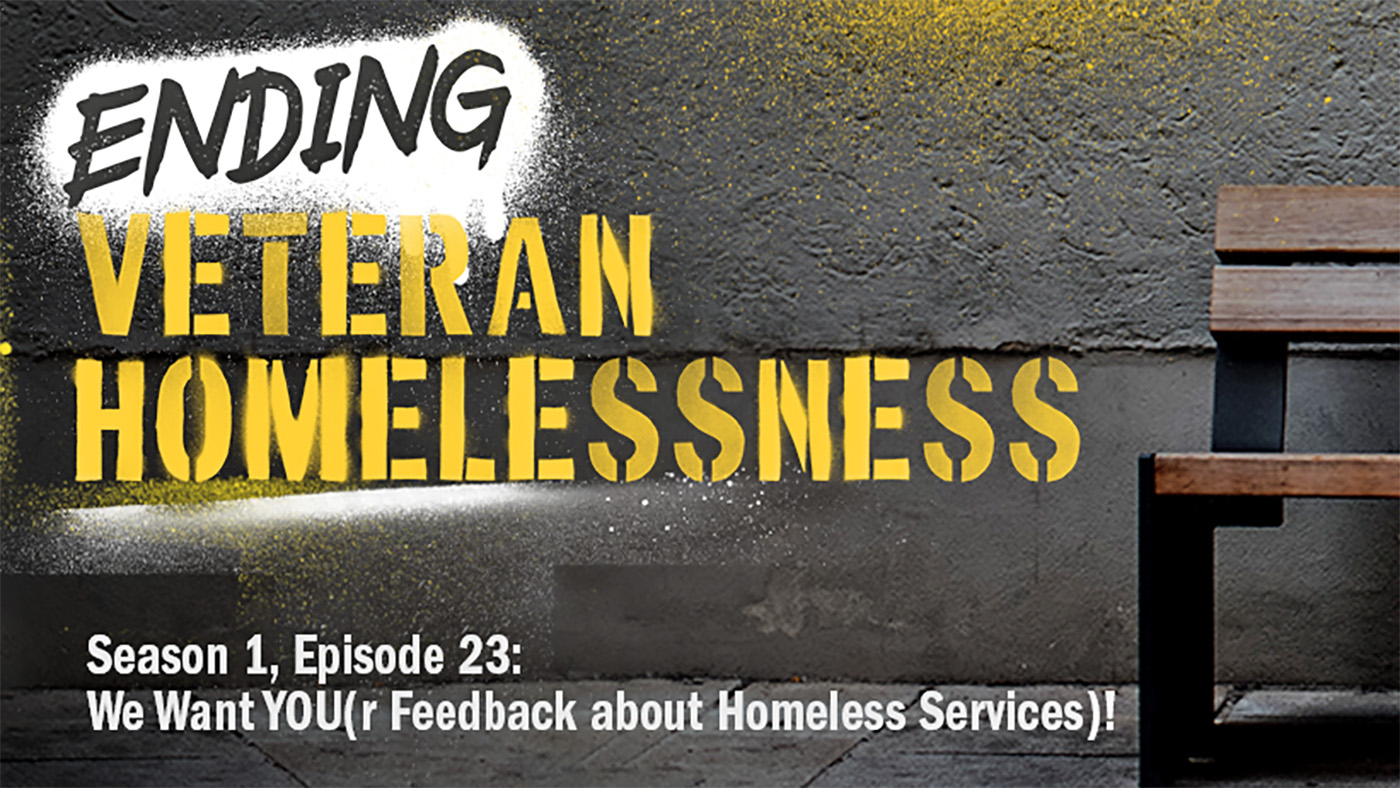Access to dental care. Free legal services. A crucial grant program to prevent Veteran homelessness. These are just a few of the expansions that have come out of VA’s annual Project CHALENG survey since it began 30 years ago.
Project CHALENG national lead Jessica Blue-Howells joined us on the Ending Veteran Homelessness podcast to discuss the ways in which the project has transformed how we’re fighting Veteran homelessness and invite participants to complete this year’s survey.
Informing our approach
VA’s response to Veteran homelessness has changed significantly since the first programs were introduced in 1987, in part because of Project CHALENG which stands for Community Homelessness Assessment, Local Education and Networking Groups.
The initiative has helped strengthen relationships between VA, the community agencies that serve Veterans at the local level and Veterans themselves. Local coordination may seem obvious now, but it was innovative at the time that Project CHALENG launched.
“VA really was stuck on the grounds of VA medical centers,” said Blue-Howells. “We really needed to wait for Veterans to come to us, to be well enough to even know to ask for services. CHALENG instead got VA out into the community to rebuild or build for the first time that trust so Veterans felt safe and interested in using VA services.”
Developing our services
Open to providers, advocates, Veterans and even concerned citizens, the survey asks participants to rate the needs of homeless Veterans in their local communities.
In addition to traditional pen and paper, the survey is available in a more versatile online form around the clock, allowing us to collect feedback from a more varied range of participants.
We then analyze the feedback to identify the most important services for homeless Veterans and any crucial gaps in those services. Read this blog post for more on how survey feedback helps develop our homeless services.
Over the last few decades of survey results, we’ve seen a clear trend that most unmet needs are ones that VA cannot address alone, highlighting the importance of continued collaboration as we move forward in our campaign to end Veteran homelessness.
The data has allowed us to develop new services, including a dental program, legal services and the Supportive Services for Veteran Families program. We’ve also been able to expand the HUD-VA Supportive Housing Program that provides vouchers, case management and clinical services for homeless Veterans.
As our tools to fight Veteran homelessness have grown, we’ve been able to cut homelessness rates in half, demonstrating that Veteran homelessness is not an intractable problem that can’t be solved.
Illuminating results
Blue-Howells shared that the most important impact CHALENG has had is better integrating VA and community homeless service providers, which has empowered VA homeless programs to be responsive to local needs. Rather than providing a national blanket policy approach, VA can be responsive to specific conditions in each community.
In addition, a major change to the survey since its inception has been adding a Veteran portion to supplement the clinician and provider perspectives. Blue-Howells said it can be enlightening to hear directly from the Veterans.
These responses have shown that Veterans feel they are getting the medical care, mental health care, case management and substance abuse treatment they need, but they continue to be hindered by a lack of affordable housing and employment opportunities.
A qualitative portion, asking for the single most important resource that could end homelessness, has further broadened the possible responses we can receive.
For those who are working hard to end Veteran homelessness, these responses can be especially meaningful, revealing the impact we have on individual Veterans.
One Veteran used the open-ended field to write: “You all probably saved my life. I was too sick to stay on the street any longer. Thank you.”
We’d love to hear from you about how we’re doing and what we can do next. Take six minutes today to complete the CHALENG 2024 Survey.
Learn about VA programs
- If you are a Veteran who is homeless or at risk for homelessness, call the National Call Center for Homeless Veterans at 877-4AID-VET (877-424-3838).
- Visit the VA Homeless Programs website to learn about housing initiatives and other programs for Veterans exiting homelessness.
- Check out the Ending Veteran Homelessness podcast to learn more about what VA is doing about Veteran homelessness.
- Learn how to get involved with housing homeless Veterans.
- Subscribe to the Homeless Programs Office newsletter to receive monthly updates about programs and supportive services for Veterans experiencing or at risk of homelessness.
Topics in this story
Link Disclaimer
This page includes links to other websites outside our control and jurisdiction. VA is not responsible for the privacy practices or the content of non-VA Web sites. We encourage you to review the privacy policy or terms and conditions of those sites to fully understand what information is collected and how it is used.
More Stories
Bob Jesse Award celebrates the achievements of a VA employee and a team or department that exemplifies innovative practices within VA.
The Medical Foster Home program offers Veterans an alternative to nursing homes.
Watch the Under Secretary for Health and a panel of experts discuss VA Health Connect tele-emergency care.






